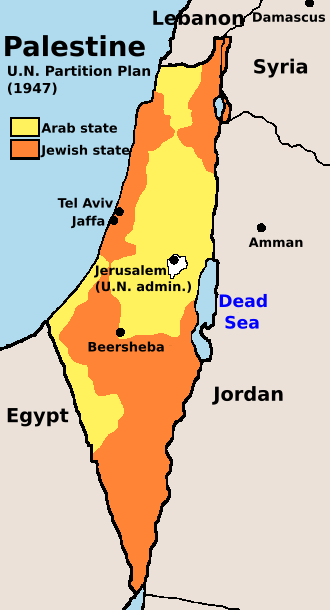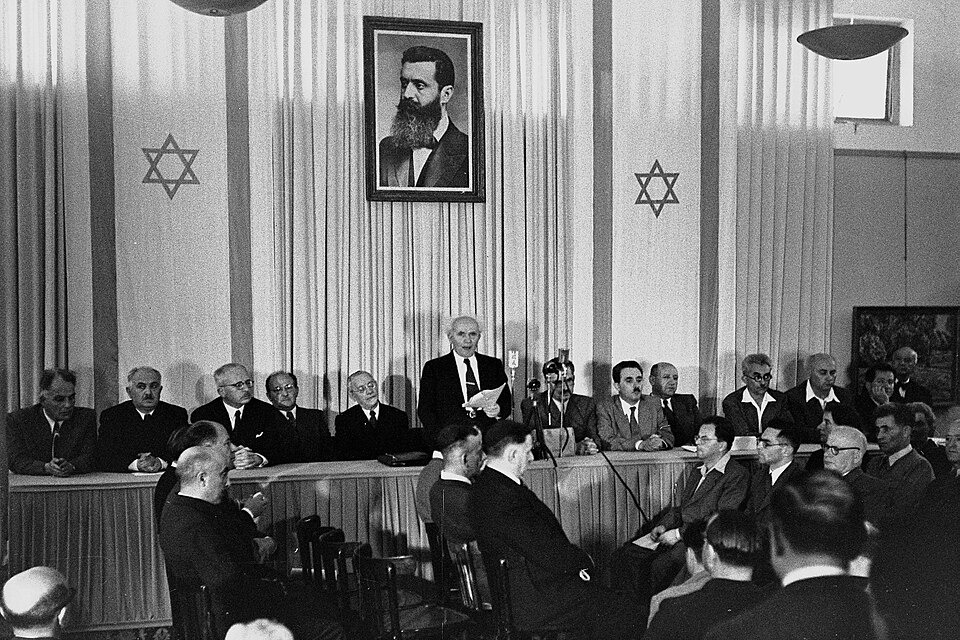IB Syllabus focus:
'Examine the origins of the state of Israel, including the post-war tensions, instability in the mandate, and the causes and effects of the 1948–1949 War.'
The establishment of the State of Israel in 1948 marked a transformative moment in Middle Eastern and world history. Its origins are deeply rooted in a mix of religious history, nationalism, colonialism, and the complex aftermath of World War II.
Background to Mandate Palestine
British Mandate: Post-World War I, the League of Nations entrusted the United Kingdom with the Mandate for Palestine, a territory that extended from the Mediterranean Sea to the east bank of the Jordan River.
Jewish Nationalism – Zionism: The Zionist movement, advocating for the return of Jews to their ancestral homeland, gained momentum in the late 19th and early 20th centuries.
Arab Nationalism: Concurrently, Arab nationalism was on the rise, with aspirations for independence and self-determination.
Jewish Immigration and Arab Resistance
Balfour Declaration: Issued in 1917, it promised support for the establishment of a "national home for the Jewish people" but also stipulated that nothing should "prejudice the civil and religious rights of existing non-Jewish communities."
Increased Immigration: Jewish immigration increased, particularly in the 1930s and 1940s due to the rise of anti-Semitism and the Holocaust in Europe.
Arab Opposition: The growing Jewish presence led to heightened tensions with the Arab population, resulting in several riots and revolts.
The Impact of WWII and the Holocaust
Holocaust: The extermination of six million Jews in Europe during the Holocaust led to increased international sympathy for the Zionist cause.
Displaced Persons: After the war, many Jewish survivors were housed in Displaced Persons camps and sought to immigrate to Palestine, increasing tensions.
British Withdrawal and UN Intervention
End of the Mandate: Britain, overwhelmed by the unmanageable tensions and the aftermath of WWII, decided to withdraw and handed the issue over to the United Nations.
UN Resolution 181: The United Nations Partition Plan for Palestine recommended the end of the British mandate and the partition of the territory into two states, one Jewish and one Arab.

The UN Partition Plan (Resolution 181, 29 November 1947) proposed separate Jewish and Arab states with Jerusalem under international administration. Boundaries reflect demographic and strategic considerations on the eve of Britain’s withdrawal. Note: this official-style rendering includes a legend consistent with contemporary UN/CIA cartography. Source
The Establishment of Israel and the 1948–1949 War
Declaration of the State of Israel
Timing: On 14 May 1948, prior to the expiration of the British mandate, David Ben-Gurion declared the establishment of Israel.

David Ben-Gurion reads the Declaration of the Establishment of the State of Israel at the Tel Aviv Museum, 14 May 1948, beneath a portrait of Theodor Herzl. The image is a staple primary source for the end of the mandate and the opening of the 1948–49 war. Photographed by Rudi Weissenstein (National Photo Collection/GPO). Source
International Recognition: The United States and the Soviet Union, among others, recognised the new state, providing it with essential diplomatic support.
The Outbreak of War
Arab Rejection: Arab nations and Palestinians rejected the UN's partition plan and regarded the declaration of Israel as an act of aggression.
Initial Clashes: Hostilities between Jewish and Arab forces escalated into a full-scale conflict once the mandate ended.
Military Dynamics and Strategies
Haganah to IDF: The Jewish paramilitary organisation, Haganah, transitioned into the Israel Defense Forces (IDF), becoming the new nation's army.
Arab Forces: Several Arab states' armies entered the conflict, with varying levels of coordination and objectives.
Causes of the 1948–1949 War
Competing Nationalisms
Zionism: The Zionist movement's goal of establishing a Jewish state in Palestine was a direct catalyst for conflict.
Arab Nationalism and Palestinian Identity: The Arabs of Palestine, alongside the neighbouring Arab states, sought to establish an Arab state encompassing the whole of Palestine.
International and Colonial Legacy
Mandate Policies: British policies during the Mandate period, including immigration controls and land sales, contributed to the tensions.
Cold War Onset: The nascent Cold War indirectly influenced the conflict, with both the USA and the USSR looking to expand their influence.
Effects of the 1948–1949 War
Immediate Consequences
Palestinian Exodus (Nakba): Approximately 700,000 Palestinians were displaced, creating a refugee crisis that remains unresolved.
Territorial Gains for Israel: Israel expanded its territory beyond the UN partition plan's proposals.
Long-term Outcomes
Armistice Lines: These became the de facto borders of Israel but were not universally recognised.

This comparative map juxtaposes the 1947 UN partition allocations with the 1949 armistice lines, highlighting areas incorporated into Israel beyond the UN plan and territories held by Egypt and Jordan. It clarifies the emergence of the “Green Line” as the de facto border after the war. Source
Political Repercussions: The war entrenched the division between Israelis and Palestinians and set the stage for future Arab-Israeli conflicts.
UNRWA Creation: The United Nations Relief and Works Agency for Palestine Refugees in the Near East (UNRWA) was established to address the needs of Palestinian refugees.
Societal Impacts
Israeli Society: A sense of national resilience and unity emerged, along with a diverse society due to the mass immigration of Jews from various parts of the world.
Arab World: The defeat led to significant soul-searching and was a precipitating factor in the rise of Arab nationalism and later conflicts.
The study of Israel's origins requires an understanding of the broader socio-political context of the time, including the impact of European colonialism, the interplay of Jewish and Arab nationalisms, and the pivotal decisions made by international bodies like the United Nations. These elements combined to shape the creation of a Jewish state amidst a complex and hostile regional environment. The 1948–1949 war, in particular, set a precedent for the ongoing conflict, establishing patterns of displacement, territorial dispute, and political contention that have persisted into the 21st century.
FAQ
The 1947 UN Partition Plan attempted to balance the concerns of both Jewish and Arab populations in Palestine by proposing a two-state solution. It aimed to establish separate Jewish and Arab states while maintaining economic unity through a series of economic unions and preserving religious and minority rights. Jerusalem was designated as an international city due to its significance to both communities. However, the plan was rejected by the Arab states and Palestinian leaders as they felt it was unjust, particularly as it allocated more land to the Jewish minority and did not fully address their aspirations for self-determination and national sovereignty.
The Holocaust had a profound impact on the international community's attitude towards the founding of the State of Israel. The scale of the atrocity and the plight of the Jewish survivors underscored the urgency of resolving the issue of Jewish statelessness and gave moral impetus to the Zionist cause. The guilt and responsibility felt by many in the aftermath of World War II translated into increased support for a Jewish homeland as a refuge for the survivors of the Holocaust. This shift in sentiment was evident in the United Nations' support for the partition of Palestine and the relatively prompt recognition of Israel by major world powers.
Foreign powers played varied roles in the Arab-Israeli War of 1948-1949. The United States and the Soviet Union were among the first to recognise the newly declared State of Israel, providing it with critical political support. In terms of arms supply, Czechoslovakia, under Soviet influence, became a crucial arms supplier to Israel, while the British, who had equipped Arab armies before their withdrawal, enforced an arms embargo that affected both sides. Additionally, the United Nations was involved in mediation efforts and eventually imposed a series of ceasefires, but the role of the UN was limited by the superpowers’ burgeoning Cold War rivalry, which saw both the US and USSR seeking influence in the region.
The Arab states' failure to prevent the establishment of Israel in 1948 can be attributed to several key factors. Firstly, there was a lack of unity and coordination among the Arab states, with conflicting agendas and limited cooperation. Secondly, the Arab forces were outmatched by the well-organized and motivated Israeli forces, which included experienced fighters from World War II. Additionally, there were significant logistical challenges and inadequate military strategies on the Arab side. Internal political pressure also distracted Arab leaders, who were more focused on their individual state interests than on a unified strategy against the establishment of Israel.
The Balfour Declaration significantly influenced British policies in Palestine, as it embodied the British government's support for the establishment of a national home for the Jewish people in Palestine. It became a cornerstone of Zionist claims to Palestine and guided British Mandate policies, particularly regarding immigration and land allocation. Despite its commitment, Britain faced difficulties reconciling the declaration with the political and demographic realities in Palestine, often leading to restrictive immigration quotas and land policies in response to Arab opposition. These measures fueled tensions between Jewish and Arab communities and contributed to the instability leading up to the 1948 Arab-Israeli War.
Practice Questions
The UN Partition Plan was pivotal in the establishment of Israel. It provided a semblance of international legitimacy to the Zionist aspirations, which had hitherto been largely unilateral. The partition heralded international recognition from major powers, with the USA and USSR leading. This acceptance was crucial for Israel's nascent statehood, bolstering its diplomatic standing and justifying its declaration of independence. The plan, although never fully implemented due to Arab rejection, served as a de facto blueprint for Israel's borders and underlined the international community's move towards a two-state solution.
The 1948–1949 War had profound and immediate effects on both communities. For Israelis, the war secured independence and expanded territories, fostering a strong national identity and resilience. It also catalysed mass Jewish immigration, shaping a multicultural Israeli society. For Palestinians, the war resulted in the Nakba, a catastrophic displacement creating a protracted refugee crisis. It dismantled their social fabric and indefinitely deferred the goal of statehood. The war solidified a divide between the two peoples, erecting barriers that extended beyond the physical to the psychological, perpetuating a legacy of distrust and conflict.

